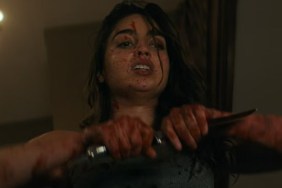
We Need to Talk about Kevin opens with a ghostly backdoor drape wafting in the night breeze. The sound of a sprinkler echoes throughout the theater as we’re drawn deeper into a bright ethereal light. White is soon replaced with red as we’re whisked to the La Tomatina festival in Valencia, Spain. It’s our first glimpse of Eva (Tilda Swinton) as she’s carried on her back over the masses before she’s lowered to the ground and showered with tomato pulp. Drenched in red. Alive. Laughing. Happy.
The scene flashes once again. We’re placed in an unknown future. Eva’s hair is longer. She’s no longer smiling and her house and car have just been splattered with red paint. The metaphorical gore drips from her awning, kicking off one of the most elegant horror films I’ve ever seen. We Need to Talk about Kevin is creepy, sophisticated and rippling with tension.
Co-writer and director Lynne Ramsay is a name I am familiar with, but I had never seen any of her films. I’ve had Ratcatcher on my list of must sees for some time and it will climb a little higher on that list after seeing We Need to Talk about Kevin.
It’s evident, very early on, Ramsay is a skilled technician. Her emphasis on sound and color, her close-ups, the way this film is edited and the fascinating musical choices continually add layers to this haunting tableau. The simple sound of a yard sprinkler creates its own mood in a film that seems to be equally sympathetic and judgmental toward parents of delinquent children. Who’s to blame for the evil our kids do? Eva certainly is carrying the brunt of the burden her young son Kevin has bestowed on her.
Swinton continues to excel in virtually every performance she tackles. The past two years have seen her hailed for performances in Julia and I Am Love. Personally, neither of those films appealed to me, but Swinton’s performance in each was undeniable. As Eva, the tortured mother of a child that can, does and will do unspeakable things, We Need to Talk about Kevin follows her story as she attempts to cleanse her conscience of the blood that has stained it.
This movie, however, isn’t one to bend in favor of compassion. Based on the novel by Lionel Shriver, We Need to Talk about Kevin is a film with an opinion; it forces the audience to either defend or condemn however they see fit, but this is also the one aspect of the film that presents it’s only real flaw.
To put it quite simply, Eva and her husband Franklin (John C. Reilly) don’t just need to talk about Kevin, they need to get the kid some serious help. The film acquiesces to the unfortunate “he’s just doing what boys do” cliche. While Eva is consistently witnessing Kevin’s deviant behavior, Franklin is an oblivious dolt, always assuming Eva is exaggerating and then running out to buy him a new bow and arrow. Perhaps it’s because we as the audience have seen the truth about Kevin that makes Franklin’s naivete so irritating, but it is a flaw in the film. Fortunately, Franklin isn’t around too much to muck things up too bad.
Playing the titular Kevin, Jasper Newell and Ezra Miller are responsible for bringing the demonic young tyke to life. As the younger version of the vindictive child, Newell plays him with a perfect balance of menace and indifference. It’s impossible not to think of The Omen while watching, but We Need to Talk about Kevin exists in a far more connective reality than that film. Kevin is no Damien. Kevin could potentially be anyone’s child. Unfortunately for Eva, he’s hers.
As Kevin nears his 16th birthday, Miller steps in and delivers a performance that won’t soon leave your memory. Whatever he’s plotting in the sterile, hospital-esque bedroom of his is initially unclear, but as the mystery at the core of the film begins to piece itself together, it becomes a waiting game as we watch as Eva is tortured every step of the way and not even a guinea pig is safe.
I’m not sure if there is a level of relief to be had at the end of We Need to Talk about Kevin. Ramsay has fashioned an outright stunner that comes at you from every angle. The sound design, the editing, the cinematography, the direction and Swinton’s performance are Oscar caliber. It’s a film to be seen in a theater, with you sitting dead center where you’ll best feel each scene breathing in and out on the audience. Once it begins, you’re in Ramsay’s hands and it doesn’t take more than a minute for her to gain a tight grip.










